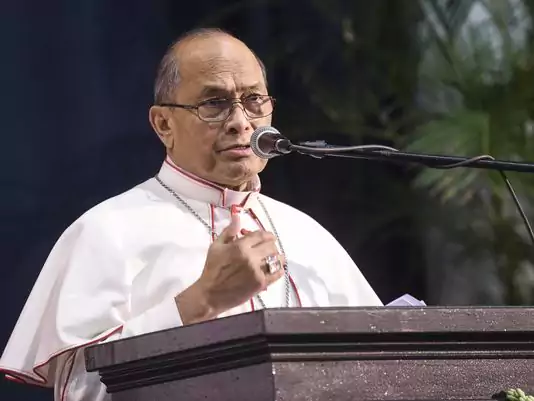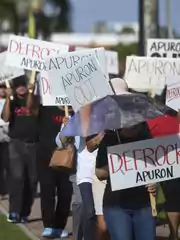Apuron Trial Outcome Will Likely Stay Secret
By Haidee V Eugenio
A canonical trial, such as the ongoing trial of Archbishop Anthony Apuron, is a highly secretive process with many possible outcomes, according to canon lawyer Patrick J. Wall, who said Apuron will not be at the Vatican for any of the proceedings. Wall, a former Catholic priest, is lead researcher for Jeff Anderson & Associates, a Minnesota-based law firm representing victims of childhood sexual abuse. He is helping to dissect the defenses that dioceses mount during trial. He co-authored “Sex, Priests, and Secret Codes,” a leading book on the 2,000-year history of sexual abuse in the Catholic Church. Pope Francis placed Apuron on leave last June after several former altar boys publicly accused Apuron, 71, of molesting or raping them when he was parish priest in Agat, in the 1970s. Only the pope can take action against a bishop or archbishop, and the Vatican has confirmed there is an ongoing canonical trial for Apuron. “Few people outside of the Vatican know as much about the canonical trial process as Patrick does,” said Joelle Casteix, volunteer western regional director for the Illinois-based Survivors Network of those Abused by Priests, or SNAP, the world’s largest network of clergy abuse survivors. Wall said Pope Francis has two options in the Apuron trial — administrative action or judicial action — after the pope's appointed auditor, or investigator, gathers and presents the facts. Wall said a likely candidate to serve as the pope's auditor is Reverend James Conn, a professor of Canon Law at the Pontifical Gregorian University in Rome, and professor of the Practice of Canon Law at Boston College. If the pope takes administrative action, Wall said, he can instruct the Congregation for Bishops to order Apuron to a life of prayer and penance in a Capuchin monastery far from Guam. “This does two things: reduces scandal, and allows Apuron to continue as a bishop, priest and Capuchin,” Wall said. If the pope takes judicial action, he may instruct the Congregation for the Doctrine of the Faith and Cardinal Gerhard Mueller, as Prefect, to proceed, following the Sacramentum Santitatis Tutela, Wall said. “Mueller will then appoint Chicago Jesuit, Reverend Robert Geisinger S.J., J.C.D. as promoter of justice to instruct the matter,” Wall said. “Archbishop Apuron will be informed in writing of the charges and advised to retain a canonist — a canon lawyer who will defend him and submit paperwork on his behalf to the Vatican.” Wall said, “The Promoter of Justice or his delegate will build on the auditors’ investigation and delve deeper into the facts and circumstances, including taking depositions and gathering documents from Guam.” Apuron will then review the entire case file. “Then comes the decision: whether the pope, through the CDF, will allow Apuron to remain a bishop, priest and/or Capuchin,” Wall said. Pope Francis could laicize Apuron, removing him as a bishop and priest while allowing him to remain a non-priest Capuchin friar, or “brother,” able to live anywhere in the world and work for the order, Wall said. “Or the pope could remove Apuron completely and demote him to be a lay person,” Wall said. Wall said no matter the decision, “it will be rendered in secret, likely signed by Cardinal Muller as Prefect and served on Apuron through the Papal Nuncio and the local bishop wherever Apuron is living. Apuron has been located in Fairfield, California, by the law firm of Lujan and Wolff, which represents 16 former altar boys who accused Catholic priests of sexually abusing them decades ago. “If Apuron stays in Fairfield, California, that bishop is Jaime Soto of Sacramento,” Wall added.
David Sablan, president of Concerned Catholics of Guam, said Wednesday the group is pleased that the canonical trial is ongoing. “Hopefully, the result will be justice for the victims, Apuron will be defrocked and Apuron will be removed as Archbishop of Agana,” Sablan said. “No matter the outcome, this is a test for Pope Francis and his commitment to discipline bishops in the protection of minors,” Wall said. Although it is called a canonical trial, the process is unlike trials most people have seen, Wall said. For example, there is no jury. “Secrecy is king. There will be no public hearing,” Wall said. “The process began in secret, will be conducted in secret, decided in secret and the findings will be kept in secret Vatican archives.” The procedure is based on the Code of Canon law and the Sacramentum Santitatis Tutela, promulgated in 2001, Wall added. Contact: heugenio@guampdn.com
|
.
Any original material on these pages is copyright © BishopAccountability.org 2004. Reproduce freely with attribution.

